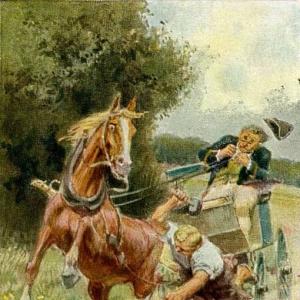Reading time: 7 min
A farmer once had a faithful dog called Sultan, who had grown old, and lost all his teeth, so that he could no longer hold anything fast. One day the farmer was standing with his wife before the house-door, and said, „To-morrow I intend to shoot Old Sultan, he is no longer of any use.“ His wife, who felt pity for the faithful beast, answered, „He has served us so long, and been so faithful, that we might well give him his keep.“
„Eh! what?“ said the man. „You are not very sharp. He has not a tooth left in his mouth, and not a thief is afraid of him. Now he may be off. If he has served us, he has had good feeding for it.“ The poor dog, who was lying stretched out in the sun not far off, had heard everything, and was sorry that the morrow was to be his last day. He had a good friend, the wolf, and he crept out in the evening into the forest to him, and complained of the fate that awaited him.
„Hark ye, gossip,“ said the wolf, „be of good cheer, I will help you out of your trouble. I have thought of something. To-morrow, early in the morning, your master is going with his wife to make hay, and they will take their little child with them, for no one will be left behind in the house. They are wont, during work-time, to lay the child under the hedge in the shade. You lay yourself there too, just as if you wished to guard it.
Then I will come out of the wood, and carry off the child. You must rush swiftly after me, as if you would seize it again from me. I will let it fall, and you will take it back to its parents, who will think that you have saved it, and will be far too grateful to do you any harm. On the contrary, you will be in high favor, and they will never let you want for anything again.“ The plan pleased the dog, and it was carried out just as it was arranged.
The father screamed when he saw the Wolf running across the field with his child, but when Old Sultan brought it back, then he was full of joy, and stroked him and said, „Not a hair of yours shall be hurt, you shall eat my bread free as long as you live.“ And to his wife he said, „Go home at once and make Old Sultan some bread-sop that he will not have to bite, and bring the pillow out of my bed, I will give him that to lie upon.“
Henceforth Old Sultan was as well off as he could wish to be. Soon afterwards the wolf visited him, and was pleased that everything had succeeded so well. „But, gossip,“ said he, „you will just wink an eye if when I have a chance, I carry off one of your master’s fat sheep.“ – „Do not reckon upon that,“ answered the dog. „I will remain true to my master. I cannot agree to that.“
The wolf, who thought that this could not be spoken in earnest, came creeping about in the night and was going to take away the sheep. But the farmer, to whom the faithful Sultan had told the wolf’s plan, caught him and dressed his hide soundly with the flail. The wolf had to pack off, but he cried out to the dog, „Wait a bit, you scoundrel, you shall pay for this.“
The next morning the wolf sent the boar to challenge the dog to come out into the forest so that they might settle the affair. Old Sultan could find no one to stand by him but a cat with only three legs, and as they went out together the poor cat limped along, and at the same time stretched out her tail into the air with pain. The wolf and his friend were already on the spot appointed, but when they saw their enemy coming they thought that he was bringing a sabre with him, for they mistook the outstretched tail of the cat for one.
And when the poor beast hopped on its three legs, they could only think every time that it was picking up a stone to throw at them. So they were both afraid. The wild boar crept into the under-wood and the wolf jumped up a tree. The dog and the cat, when they came up, wondered that there was no one to be seen. The wild boar, however, had not been able to hide himself altogether; and one of his ears was still to be seen.
Whilst the cat was looking carefully about, the boar moved his ear. The cat, who thought it was a mouse moving there, jumped upon it and bit it hard. The boar made a fearful noise and ran away, crying out, „The guilty one is up in the tree.“ The dog and cat looked up and saw the wolf, who was ashamed of having shown himself so timid, and made friends with the dog.
 Learn languages. Double-tap on a word.Learn languages in context with Childstories.org and Deepl.com.
Learn languages. Double-tap on a word.Learn languages in context with Childstories.org and Deepl.com.Backgrounds
Interpretations
Adaptions
Summary
Abstract
Linguistics
„Old Sultan“ is a lesser-known fairy tale from the Brothers Grimm, appearing as tale number 48 in their collection „Grimms‘ Fairy Tales“ (Kinder- und Hausmärchen). The story, which can be categorized as a humorous animal tale, focuses on themes of loyalty, friendship, and the value of wisdom that comes with age.
In „Old Sultan,“ an old, toothless farm dog named Sultan has served his master loyally for many years. However, the farmer believes that Sultan is no longer useful and plans to put him down. Overhearing the farmer’s plan, Sultan confides in his friend, a cunning wolf. The wolf devises a scheme to help Sultan prove his worth to his master. The wolf suggests that he will pretend to attack the farmer’s child while Sultan pretends to save the child by fighting off the wolf. The plan works, and the farmer is grateful to Sultan for saving his child, realizing that the old dog still has value.
Later, the wolf asks Sultan to repay the favor by allowing him to take one of the farmer’s sheep. Sultan, unwilling to betray his master, comes up with a clever plan to protect the sheep and outwit the wolf. He tricks the wolf into taking a sack filled with bees instead of a sheep. When the wolf bites into the sack, the bees sting him, and the wolf flees in pain. In the end, the farmer appreciates Sultan’s loyalty and wisdom, and the old dog is allowed to live out the rest of his days on the farm.
The Brothers Grimm were linguists, cultural researchers, and authors who collected and compiled various European folktales, myths, and legends. Their work aimed to preserve these stories for future generations and contributed significantly to the study of folklore. The fairy tales collected by the Brothers Grimm often originated from oral storytelling traditions and were passed down through generations. These stories often reflected the culture, customs, and beliefs of the communities from which they were collected. „Old Sultan“ is one such tale that explores themes of loyalty, friendship, and the value of the elderly. Like many other Grimm tales, „Old Sultan“ has been translated into numerous languages and adapted into various forms of media, including film, television, and theater.
The Brothers Grimm’s collection of fairy tales has had a lasting impact on Western literature and popular culture. Their stories have inspired countless adaptations and retellings, serving as a foundation for many modern works of fiction. The themes explored in their tales, such as those found in „Old Sultan,“ continue to resonate with audiences worldwide, demonstrating the timeless appeal of these stories. „Old Sultan“ emphasizes the importance of loyalty, friendship, and recognizing the wisdom that comes with age. The tale reminds readers to appreciate the value of those who have served them loyally and not to underestimate the capabilities of the elderly.
„Old Sultan“ is a charming and humorous animal tale from the Brothers Grimm that conveys various themes and lessons. Some interpretations of the story include.
Loyalty: The story highlights the importance of loyalty and the bond between a pet and its owner. Despite his master’s initial decision to kill him, Sultan remains loyal to the farmer and protects his family. This loyalty is rewarded when the farmer sees Sultan’s true worth and promises to care for him for the rest of his life. One of the central themes of „Old Sultan“ is the importance of loyalty and friendship. Sultan’s loyalty to his master is unwavering, even when the farmer considers putting him down. The friendship between Sultan and the wolf also plays a crucial role in the story, with each animal helping the other in their time of need.
Friendship: The friendship between Sultan and the wolf plays a significant role in the story. The wolf helps Sultan regain his value in the eyes of his master by devising a plan. However, Sultan’s loyalty to his master outweighs his friendship with the wolf, demonstrating the importance of staying true to one’s principles.
The value of the elderly: „Old Sultan“ also addresses the issue of ageism, emphasizing that older individuals still have value and deserve respect. Sultan, though old and toothless, proves himself to be resourceful and valuable to the farmer’s family. This teaches the reader not to underestimate or dismiss the elderly, as they can still make significant contributions. The tale highlights the value of wisdom that comes with age. Despite being old and toothless, Sultan proves to be resourceful and clever in both saving the farmer’s child and protecting the sheep. The story serves as a reminder not to underestimate the abilities and wisdom of older individuals.
Cleverness and wit: The story showcases the power of wit and intelligence. Both Sultan and the wolf use cunning strategies to achieve their goals, and ultimately, it is Sultan’s cleverness that secures his place in the farmer’s family. Throughout the story, Sultan demonstrates his cunning and resourcefulness in facing challenges. Both his plan to save the child and his trick to protect the sheep from the wolf showcase his quick thinking and ingenuity.
Overcoming fear and misunderstanding: The climactic fight scene demonstrates how fear and misunderstanding can lead to conflict. The wolf and the boar mistake the cat’s tail for a weapon and her hopping for an aggressive act, causing them to cower in fear. This highlights the importance of understanding and communication in resolving disputes.
Gratitude and appreciation: „Old Sultan“ also emphasizes the importance of gratitude and appreciation. After Sultan saves his child, the farmer realizes the value of the old dog and allows him to live out his days in peace. The story teaches the importance of recognizing and appreciating the contributions of others, particularly those who have served loyally.
The consequences of deception: Although the story is lighthearted, it also touches on the consequences of deception. The wolf’s plan to deceive the farmer backfires when Sultan chooses loyalty to his master over repaying the favor. The tale demonstrates that deception can have unintended consequences and that honesty and loyalty are more valuable traits.
These interpretations of „Old Sultan“ offer insights into the themes and lessons conveyed by the tale, providing readers with a deeper understanding of the story’s moral underpinnings. The story serves as a reminder of the importance of loyalty, friendship, wisdom, and gratitude in our lives.
„Old Sultan“ is a fairy tale collected by the Brothers Grimm, Jacob and Wilhelm, in their famous book „Kinder- und Hausmärchen“ (Children’s and Household Tales). The first edition of the book was published in 1812 in Germany. Although „Old Sultan“ is a lesser-known fairy tale from the Brothers Grimm, it has seen some adaptations and references in various forms of media. Some examples include.
Literature: „Old Sultan“ has been retold in numerous fairy tale anthologies and collections, often with slight variations in the story or illustrations. These retellings often focus on the themes of loyalty, friendship, and the wisdom that comes with age.
Children’s books: The story has been adapted into numerous children’s books, including „Old Sultan“ by Marilee Heyer, „Sultan and the Dogs“ by Jane Yolen, and „Old Sultan: A Grimm’s Fairy Tale“ by William Nicholson. The story has been adapted into comics and graphic novels, including „Old Sultan“ by David Wiesner and „The Wolf and the Fox“ by Reynold Jay.
Television: The story has been adapted into several animated films and TV shows, including „The Talking Parcel“ (1978), „Simsala Grimm“ (1999-2000), and „Grimm’s Fairy Tale Classics“ (1987-1988). „SimsalaGrimm“ (1999-2010) The animated television series „SimsalaGrimm“ adapted various stories from the Brothers Grimm, including an episode based on „Old Sultan.“ The episode remains faithful to the original tale, featuring the clever old dog and his cunning wolf friend.
Audiobooks: „Old Sultan“ has been adapted into radio plays and audiobooks, providing an auditory experience of the story for children and adults alike. These adaptations often include voice actors, sound effects, and music to bring the story to life.
Theater: The story has been adapted into stage productions, including „Old Sultan: A Play for Young People“ by Lani Brockman and „The Adventures of Old Sultan“ by L.A. Theater Works.
Operas: The story has been adapted into operas, including „Alte Sultan“ by Ernst Toch and „Sultan the Dog“ by Edwin Roxburgh.
While „Old Sultan“ has not received as many adaptations as some of the more popular Grimm fairy tales, its presence in anthologies, television, and audio formats demonstrates its enduring appeal. The story’s themes of loyalty, friendship, and the wisdom of age continue to resonate with audiences, inspiring creative retellings and adaptations. Overall, the story of „Old Sultan“ has been adapted into various forms of media, showcasing its timeless appeal and enduring popularity.
„Old Sultan“ is a humorous animal tale from the Brothers Grimm that tells the story of an old farm dog named Sultan and the lessons of loyalty, friendship, and wisdom that come with age. Sultan is an old, toothless dog who has served his master loyally for many years. One day, he overhears his master discussing putting him down because he’s no longer useful. Distraught, Sultan shares his concerns with his friend, a cunning wolf. The wolf comes up with a plan to help Sultan prove his worth to his master.
The wolf pretends to attack the farmer’s child, while Sultan pretends to save the child by driving the wolf away. The plan works, and the grateful farmer recognizes that the old dog still has value. Later, the wolf asks Sultan to repay the favor by allowing him to take one of the farmer’s sheep for a meal. Not wanting to betray his master, Sultan comes up with a clever plan to outwit the wolf. He tricks the wolf into taking a sack filled with bees instead of a sheep. When the wolf bites into the sack, the bees sting him, causing him to flee in pain.
In the end, the farmer appreciates Sultan’s loyalty and wisdom, allowing the old dog to live out the rest of his days on the farm. „Old Sultan“ teaches the importance of loyalty, friendship, and recognizing the wisdom that comes with age, reminding readers to appreciate the value of those who have served them loyally and not to underestimate the capabilities of the elderly.
„Old Sultan“ is a fairy tale by the Brothers Grimm about a faithful old dog named Sultan who has lost all his teeth and is deemed useless by his farmer master. The farmer decides to shoot Sultan the next day, but his wife argues that the dog deserves to be cared for in his old age. Sultan overhears their conversation and seeks help from his friend, the wolf.
The wolf devises a plan to restore Sultan’s value in the eyes of his master. When the farmer and his wife go to make hay, leaving their child under a hedge, the wolf pretends to kidnap the baby. Sultan chases the wolf, who drops the child, allowing Sultan to return the baby to its grateful parents. They promise to take care of Sultan for the rest of his life. Satisfied with the outcome, the wolf later visits Sultan and asks for help in stealing a sheep from the farmer. Sultan refuses, staying loyal to his master. The wolf, not believing him, attempts to steal a sheep but is caught and beaten by the farmer. The angry wolf challenges Sultan to a fight in the forest.
Sultan, accompanied by a three-legged cat, meets the wolf and a wild boar for the fight. However, the wolf and the boar mistake the cat’s outstretched tail for a sabre and her hopping for stone-throwing. Frightened, the boar hides and the wolf climbs a tree. The cat inadvertently bites the boar’s ear, causing it to run away and reveal the wolf’s location. Ashamed of his cowardice, the wolf makes peace with Sultan, ending the conflict.
A linguistic analysis of the fairy tale „Old Sultan“ by the Brothers Grimm reveals several interesting features typical of oral narratives and folklore. The tale’s language and style reflect its origins as a traditional story shared across generations.
Simple Sentence Structure: The sentences in „Old Sultan“ are predominantly simple or compound, which is typical of oral storytelling. This structure makes the tale easy to follow for listeners, including children. For example, „The father screamed when he saw the Wolf running across the field with his child,“ combines straightforward actions and reactions.
Repetition: The story uses repetition as a literary device to reinforce key themes and actions, making it memorable. The plan devised by the wolf, for example, is recounted fully when described and then again in its execution, providing clarity and emphasis.
Direct Speech: Dialogue plays a crucial role in advancing the plot and revealing character relationships. The direct speech in lines like, „Hark ye, gossip,“ said the wolf, „be of good cheer, I will help you out of your trouble,“ offers insights into the characters’ personalities and intentions while also engaging the audience.
Archaic Language: The tale incorporates some archaic expressions, such as „Hark ye“ and „gossip,“ which were more common in older English usage. These elements lend a timeless quality to the story and connect it to its historical roots.
Personification and Anthropomorphism: Animals in the story are given human traits, thoughts, and dialogues, which are common in fairy tales. This anthropomorphism allows readers, especially children, to connect with the characters and understand moral lessons from their actions and interactions.
Moral and Ethical Themes: Through its language and plot, the story explores themes of loyalty, gratitude, deception, and forgiveness. Phrases that indicate moral lessons are accessible and explicit, such as the farmer’s change of heart toward Sultan when he says, „Not a hair of yours shall be hurt. “
Expressive Imagery and Descriptive Language: While the language is largely straightforward, there are moments of vivid imagery, such as the cat limping on three legs with its tail up, which serve to heighten tension and humor.
Narrative Voice: The third-person omniscient narrative voice allows the storyteller to present the thoughts and feelings of both human and animal characters, providing a comprehensive understanding of the unfolding events.
In summary, the linguistic elements of „Old Sultan“ contribute to its effectiveness as a fairy tale that is both engaging and didactic, using simple yet evocative language that reflects its folkloric origins.
Information for scientific analysis
Fairy tale statistics | Value |
|---|---|
| Number | KHM 48 |
| Aarne-Thompson-Uther-Index | ATU Typ 101 |
| Translations | DE, EN, DA, ES, FR, PT, IT, JA, NL, PL, RU, TR, VI, ZH |
| Readability Index by Björnsson | 26.9 |
| Flesch-Reading-Ease Index | 87.3 |
| Flesch–Kincaid Grade-Level | 5.9 |
| Gunning Fog Index | 8.7 |
| Coleman–Liau Index | 6.4 |
| SMOG Index | 7.2 |
| Automated Readability Index | 6 |
| Character Count | 4.346 |
| Letter Count | 3.284 |
| Sentence Count | 45 |
| Word Count | 870 |
| Average Words per Sentence | 19,33 |
| Words with more than 6 letters | 66 |
| Percentage of long words | 7.6% |
| Number of Syllables | 1.027 |
| Average Syllables per Word | 1,18 |
| Words with three Syllables | 21 |
| Percentage Words with three Syllables | 2.4% |

 Facebook
Facebook  Whatsapp
Whatsapp  Messenger
Messenger  Telegram
Telegram Reddit
Reddit















